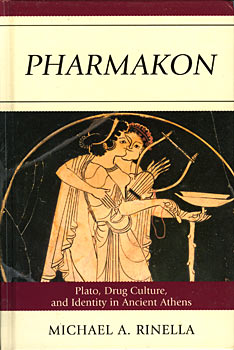
[an error occurred while processing this directive]
Employing a diverse array of materials ranging from literature, philosophy, medicine, botany, pharmacology, religion, magic, and law, Pharmakon fundamentally reframes the conceptual context of how we read and interpret Plato's dialogues. Michael A. Rinella demonstrates how the power and truth claims of philosophy, repeatedly likened to a pharmakon, opposes itself to the cultural authority of a host of other occupations in ancient Greek society who derived their powers from, or likened their authority to, some pharmakon. These included Dionysian and Eleusinian religion, physicians and other healers, magicians and other magic workers, poets, sophists, rhetoricians, as well as others.
Accessible to the general reader, yet challenging to the specialist, Pharmakon is a comprehensive examination of the place of drugs in ancient thought that will compel the reader to understand Plato in a new way.
-- Anthony Preus, Binghamton University
"Rinella's discussion of the nature and prevalence of drugs in the Classical Age of Athens is an essential context for a major theme in the Platonic dialogues and provides a valuable background for any student of the great philosopher's works. As Rinella astutely demonstrates, Plato appears to have been the first to address the problem of drug-induced ecstasy as dangerous to the well-ordered functioning of society, leading to potentially criminal behavior and nonrational modes of thought, and the philosopher's solution to the problem as the ánoble lie' still survives in our current drug policy."
-- Carl A. P. Ruck, Boston University
BACK COVER #
Pharmakon: Plato, Drug Culture, and Identity in Ancient Athens examines the emerging concern for controlling states of psychological ecstasy in the history of western thought, focusing on ancient Greece (c. 750 - 146 BCE), particularly the Classical Period (c. 500 - 336 BCE) and especially the dialogues of the Athenian philosopher Plato (427 - 347 BCE).Employing a diverse array of materials ranging from literature, philosophy, medicine, botany, pharmacology, religion, magic, and law, Pharmakon fundamentally reframes the conceptual context of how we read and interpret Plato's dialogues. Michael A. Rinella demonstrates how the power and truth claims of philosophy, repeatedly likened to a pharmakon, opposes itself to the cultural authority of a host of other occupations in ancient Greek society who derived their powers from, or likened their authority to, some pharmakon. These included Dionysian and Eleusinian religion, physicians and other healers, magicians and other magic workers, poets, sophists, rhetoricians, as well as others.
Accessible to the general reader, yet challenging to the specialist, Pharmakon is a comprehensive examination of the place of drugs in ancient thought that will compel the reader to understand Plato in a new way.
BLURBS #
"Beginning from the most thorough review of classical intoxicants, Michael A. Rinella applies his findings in detail to many Platonic texts. His results certainly have great significance for students of Plato, but also for the history of medicine and of classical civilization generally. It is a truly impressive accomplishment."-- Anthony Preus, Binghamton University
"Rinella's discussion of the nature and prevalence of drugs in the Classical Age of Athens is an essential context for a major theme in the Platonic dialogues and provides a valuable background for any student of the great philosopher's works. As Rinella astutely demonstrates, Plato appears to have been the first to address the problem of drug-induced ecstasy as dangerous to the well-ordered functioning of society, leading to potentially criminal behavior and nonrational modes of thought, and the philosopher's solution to the problem as the ánoble lie' still survives in our current drug policy."
-- Carl A. P. Ruck, Boston University


